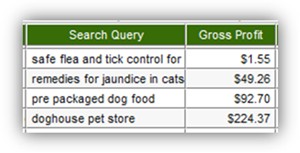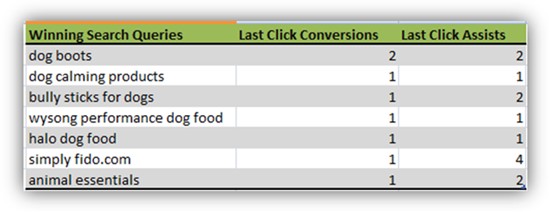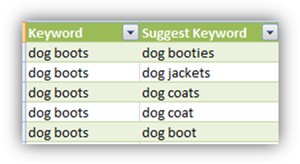Search queries, the exact word or phrases a person types, are a vital clue into the objectives of the searcher and how valuable that person is to your business.
The goal of your paid-search campaigns is to have your text ads matched with the most appropriate search queries, providing a relevant experience for the searcher and a more likely prospect for you. Keywords are the tool to use to get to the most relevant search queries.
Suppose you sell organic dog food and buy the keywords "organic dog food" (using the standard Broad match). Your ad might be shown to someone who wants "vegan organic dog food," "Blue Buffalo organic dog food," "organic dog food reviews," or even someone looking for "organic dog food safety recall."
Is each searcher relevant to you? Are all the search queries equally valuable? Can you write a single text ad that matches the intent of each of those queries and inspires searchers to click and convert?
The answer, likely, is no. Yet, search queries don't play as prominent a role in paid-search management as they should, especially with Broad-match and Phrase-match campaigns.
Match Types and Search Queries
Match types help you to expose your ads to the searchers who create the long tail of search queries. Using Broad or Phrase match types, for example, gets your ad shown to users when their search query doesn't exactly match your keywords.

Many of the search queries that are matched are highly relevant—and many of these queries should be directly purchased as keywords.
But some percentage of the search queries to which your keywords are matched is not relevant to your business, which means you're paying for unproductive clicks.
Regularly monitoring search queries is essential to keeping Broad match and Phrase match campaigns efficient. To really get the most out of your search queries, don't stop at monitoring; use keyword research to build on the converting words, and find synonyms to further expand your negative list.
Two Search Query Lists You Need
To start, you need to create two lists: a Winners list comprising search queries that converted or assisted, and a Losers list comprising search queries that did not convert or assist.
Go into your paid-search analytics tool of choice and run a search-query report. Make sure you choose a time frame that will give you an accurate sample of potential conversions and enough data to make it worth your effort. (Two to four weeks should be good.)
If you have to choose a particular campaign or ad group, focus first on the Broad match or Advanced match campaigns where you spend the most money.
To create a Winners list, run a report showing the search queries that had conversions (or your equivalent: leads, acceptable ROI, etc.) or assists, ranked from highest to lowest.
Generate a Losers list by running a report for search queries that did not result in conversions or assists, ranked by total cost.
ClickEquations users can find this data in the Query tab in the report section of its Web application. You can download the data quickly using the "Export CSV" button.

Or, you can build a custom Excel report once with ClickEquations Analyst, which you can simply refresh to any time period or client with the Quick Change palette the next time you want to mine your queries.

One important caveat: Keep in mind how attribution may affect your interpretation of results. In first- or last-click attribution, the first or last word that attracted a visitor gets all the credit for the conversion, even though other words may have helped attract those conversions. Therefore, you could be over-reporting or under-reporting the importance of a given search query.
Expand Your Search Query Synonyms With Two Free Tools
Reviewing the lists of Winners and Losers should point out some obvious search queries that you want to add to purchase or add to your negative list.
You can go even further by looking for synonyms with two free tools.
1. Google AdWords: Keyword Tool
Copy and paste your list of winners or losers into the Google AdWords Keyword Tool to get a list of closely and loosely related words.
You can customize the data by choosing the columns to display. Adding the Estimated Avg. CPC, Advertiser Competition, and Search Volume Trends columns will help you get a fuller picture.
Setting the Match Type will give you a better sense of the potential volume for any of these words. However, this data is directional at best, and you should definitely take it with a grain of salt until you test for yourself.
2. Microsoft Advertising Intelligence

Like Google, Microsoft has its own keyword research tool, but it has turned it into a handy, free Excel plug-in.
Open your Winners and Losers search query lists in Excel. Highlight the queries you want and then run the Keyword Suggestion command. The plug-in will present a list of suggestions by keyword.
Build a Search Query Habit
How regularly should you monitor your search queries? It depends how much you're spending, what portion of your campaigns run on Broad and Phrase matches, and how constrained your budget and conversion (ROI, CPL, etc.) goals are.
At a minimum, we suggest looking at them twice a month, though certainly once a week or more would be better. At the very least, focus on your highest spend Broad match and Advanced match campaigns more frequently.
A final reminder: It's not enough to just mine search query reports and add the appropriate queries to their respective ad groups. Make sure that when adding search queries to an existing ad group the integrity of the ad group remains intact. Otherwise, consider creating new ad groups, with relevant text ads, when adding search queries.



